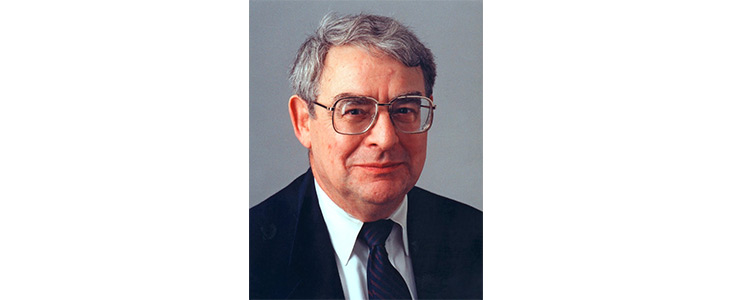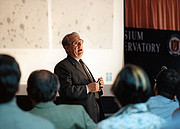Annuncio
Riccardo Giacconi (1931-2018)
È venuto a mancare il "padre dell'astronomia X" e ex-Direttore Generale dell'ESO, figura fondamentale del successo del VLT
11 Dicembre 2018
Il quinto direttore generale dell'ESO, Riccardo Giacconi, è scomparso domenica 9 dicembre 2018, all'età di 87 anni.
Riccardo Giacconi è stato alla guida dell'ESO dal 1993 al 1999, in un momento cruciale della storia dell'organizzazione. L'ESO stava costruendo quello che ora è il suo strumento di punta, il VLT (Very Large Telescope), sul Cerro Paranal e avviando quella partnership che poi sarebbe sfociata in ALMA (Atacama Large Millimeter/submillimetre Array). I successi di quegli anni, e in particolare la costruzione del VLT, hanno ben instradato l'ESO a diventare l'organizzazione astronomica leader a livello mondiale che è oggi .
Riccardo Giacconi era nato a Genova, in Italia, il 6 ottobre 1931. Dopo la laurea in Fisica e il dottorato all'Università di Milano, nel 1956 Giacconi si trasferì negli Stati Uniti, prima alla Indiana University e poi alla Princeton University per lavorare al Princeton Cosmic Ray Laboratory.
Successivamente, Giacconi iniziò il lavoro che gli valse il titolo di "padre dell'astronomia a raggi X". Incaricato dalla società American Science and Engineering di avviare un programma di scienze spaziali, Giacconi decise che il programma avrebbe dovuto concentrarsi su osservazioni alle lunghezze d'onda dei raggi X. Questa decisione ha di fatto segnato l'inizio dell'astronomia a raggi X. Nel 1962, lui e il suo gruppo scoprirono Scorpius X-1, la prima sorgente di raggi X trovata al di fuori del Sistema Solare, e il fondo cosmico di raggi X.
"Avendo anch'io lavorato nel campo dell'Astronomia a Raggi X, posso dire che Riccardo Giacconi e il suo lavoro hanno illuminato più di trent'anni della mia carriera, molto prima che venissi all'ESO", ha commentato Xavier Barcons, attuale Direttore Generale dell'ESO. "Considero un grande onore essere uno dei suoi successori in questo ruolo, presso l'organizzazione che ha contribuito così tanto a far crescere."
Durante il suo periodo come Direttore Generale dell'ESO, Giacconi ha apportato cambiamenti significativi all'organizzazione del lavoro, cambiamenti che si sono rivelati determinanti per il successo del VLT. In particolare, le sue moderne tecniche di gestione erano necessarie per programmi di grandi dimensioni e hanno favorito una maggiore collaborazione tra Germania e Cile. Grazie alla sua leadership, l'ESO è stata in grado di superare significative difficoltà tecnologiche e finanziarie nella costruzione del VLT. La prima luce di due dei quattro telescopi principali (UT) è avvenuta verso la fine del suo mandato.
Nello stesso periodo ha anche promosso ulteriori sviluppi a La Silla. Grazie al suo supporto, l'NTT (New Technology Telescope) è stato perfezionato. L'NTT ha aperto nuove strade nell'ambito dell'ingegneristica e della modellistica dei telescopi; è stato il primo telescopio con uno specchio primario controllato dal computer.
Lasciato l'ESO, Giacconi è tornato negli Stati Uniti per assumere l'incarico di Presidente della Associated Universities Incorporated (AUI), nel 2002. Nel 2002 ha ricevuto, in condivisione, il Premio Nobel per la Fisica "per i contributi pionieristici all'astrofisica, che hanno portato alla scoperta delle sorgenti cosmiche di raggi X."
Il contributo di Riccardo Giacconi come Direttore Generale ha portato l'ESO a diventare l'organizzazione di livello mondiale che è oggi: la sua leadership sarà ricordata come fondamentale per il successo duraturo dell'ESO.
Riguardo all'annuncio
| Identificazione: | ann18090 |



